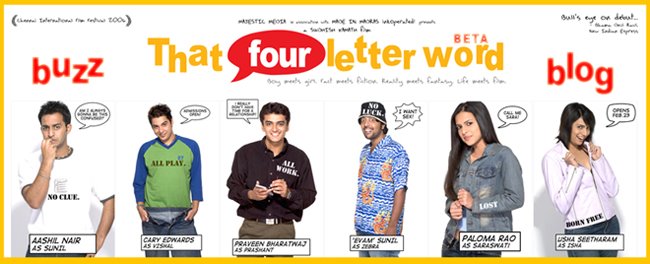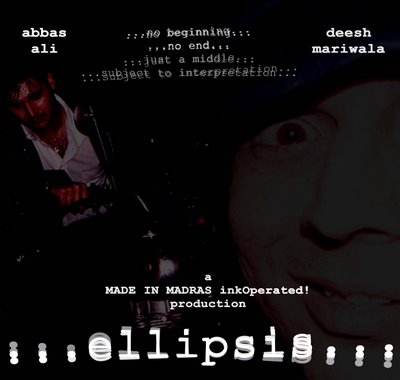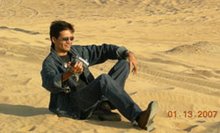Oh, that wouldn’t be much of a problem. Or at least we hope. We’ve got a decent film with us with a decent cast. Satellite rights alone these days fetch a handsome sum that would recover entire cost of production. Besides, we intend to distribute it ourselves in a small way, one step at a time. It’s our baby, we will make it crawl first before it can walk around the country and do the rounds around the world. We will make it grow from strength to strength. We have a few plans to market the film, taking it personally from one city to another city. We hope to cover ten Indian cities before it’s ready for the world.
When do you plan to release the movie?
Ideally, during Friendship Week, the first week of August. That’s exactly the mood we want people to be in when they watch the film. This movie is about a gang of friends and best watched with your gang of friends.
There’s more to our organization Made in Madras InkOperated! than TFLW. Tell us about it.
Made in Madras was what we wanted to called our film before we came up with That Four Letter Word. But then, it would have been such a cliché with Hyderabad Blues, Bombay Boys and then Made in Madras!! So we chucked the idea but the phrase is so close to our heart because we are simple people made in this simple city and we are proud of our identity. In this globalised world, I think that’s something many of us are forgetting. What was good about us! Who we really are!! Made in Madras hopes to rekindle that spirit of simplicity. It will be a society committed to bringing independent filmmakers together. In a couple of years, we will be ready to produce independent films and make the dream of first time filmmakers come true. We are also putting together a database of professionals and resources available to help you shoot your film free of cost. It will be a not-for-profit organization, run not through money but by ink! Because great ideas just require ink. Either you write them down or print them out. But put it on paper. Paperwork is all it takes to make a film! That’s the idea behind Made in Madras inkOperated! It’s also a fun company, that’s what the pun on Incorporated signifies and the exclamation is the statement we want to make through our work. A form of eccentric expression!
 We notice that you use your blog to ask for volunteers for your item dance. How useful have the blogs been? Do you plan to leverage further?
We notice that you use your blog to ask for volunteers for your item dance. How useful have the blogs been? Do you plan to leverage further?
My blog is one part of my life that I’ve made public. So that’s how the film sneaked in and found itself into my regular blog (http://sudhishkamath.blogspot.com). I started my film blog (http://thatfourletterword.blogspot.com) as an attempt to chronicle the making of the film because I realized that the behind the scenes were larger than life, in fact larger than the film itself. But I've not found the time to update it as often as I would've liked. I just put up a community on Orkut to keep people posted. We have an official site which we will update in the next one month.
It’s been an amazing journey of learning, togetherness and bonding as a family. It has taught us the importance of chasing a dream and the joy of doing it together as a team. Yes, the blogs have been useful in generating moral support. I had at least two volunteers for the item dance but its an idea we dropped. I have people offering me space to shoot. I’m touched. And if this interview is going to add to the help, I will only be overwhelmed! I will be putting down chapters that went into making the film, so that it can be published as a book, for purely selfish reasons. I want to give them away as souvenirs to every person who has been part of this film. A token of thanks. A memento.
What are your future plans?
I want to continue writing because I’ve become addicted to it. I want to finish my first five films before I turn 35. I’m ready with two of the five scripts. My second film Watcha Gonna Do, a multi-genre spoof on American films, will be the first production from Made in Madras inkOperated. And, hopefully it will make enough money to fund my other projects because I know that no producer with a sane mind will agree to fund my third, fourth and fifth films because they will not make money. I know there is a chance that they might not work but these are the kind of films I think are absolutely original. My third film, Checkbox Theory, (I’ve blogged about my Checkbox theory) is about a six-year old boy in love with an eight-year old girl. The film looks at contemporary love stories from the point of view of children. It tells us how clinical we get about love. The older we grow, the more checkboxes we look at ticking, in our choice of partner. The younger we are, the more blissfully we are in love, without any specific reason. To me, that is the pure love, nothing like first love. My fourth film, Slip of Mind, is a psycho-thriller set in the near future where there is no good left in the world. It’s an evil-versus-evil tale and each character has a virtue for a name. The characters are called Hate, Evil, Beauty, Lust, Hope and so on. It is a very dark, philosophical film with a lot of gore. My fifth, Bad News, will be a critique on TV journalism and the entire film unravels through news clippings. Each scene is a news capsule from a different channel. So each TV channel is a character and each tells its own version of the same set of incidents, starting from the abduction of an aging superstar in India, which ultimately snowball to September 11. It’s a fact-meets-fiction tale that requires a year of research. I personally believe I’m not old enough to make my fourth and fifth films yet. I hope to grow up in the next four-five years and develop the right kind of sensitivity and expertise to deal with such complex films. Meanwhile, we at Made in Madras will produce simple films, backed by a panel from the film industry. Just a matter of time before we get Mani Ratnam, Kamal Hassan, Ramgopal Varma, Farhan Akhtar and an A.R.Rahman to see what we see and get them on board as directors who will screen scripts. I personally hope to do one film a year after ensuring that Watcha Gonna Do releases in every corner of the world, no matter how long that takes. High time someone showed the finger to America’s monopoly over English films. English after all is not their language, the Brits created it. And we are/were closer to the Brits than they are/were. So, fuck you Hollywood! Here we come!
Update: I, next, starting next month, want to work on a mainstream Hindi film. I'm calling it 'Parchayi,' it's a tribute film to one of my most favourite films (I'm not saying which one but by the time it comes out, I dunno how many of you will see through it). But yes, a tribute does not mean its not original. It is entirely original because I've just taken the soul of a movie I've liked and transplanted it in a different world, with different people, with a different conflict and so, it became a very different plot with very little resemblance to the movie I'm paying tribute to. I want to make it now because it is on among the most relevant contemporary issues in Bollywood. There is a huge difference between a tribute and a remake. 'Parchayi' is an ode to orginality and fresh thinking, the need to give back something to the movies that have made us and the life around us, instead of rehashing them. To bring movies to life, you need to bring life into the movies. It's my tribute to movies and people who inspire them.
(concluded)
Want know more? That will take you back to the beginning of the series. :D




